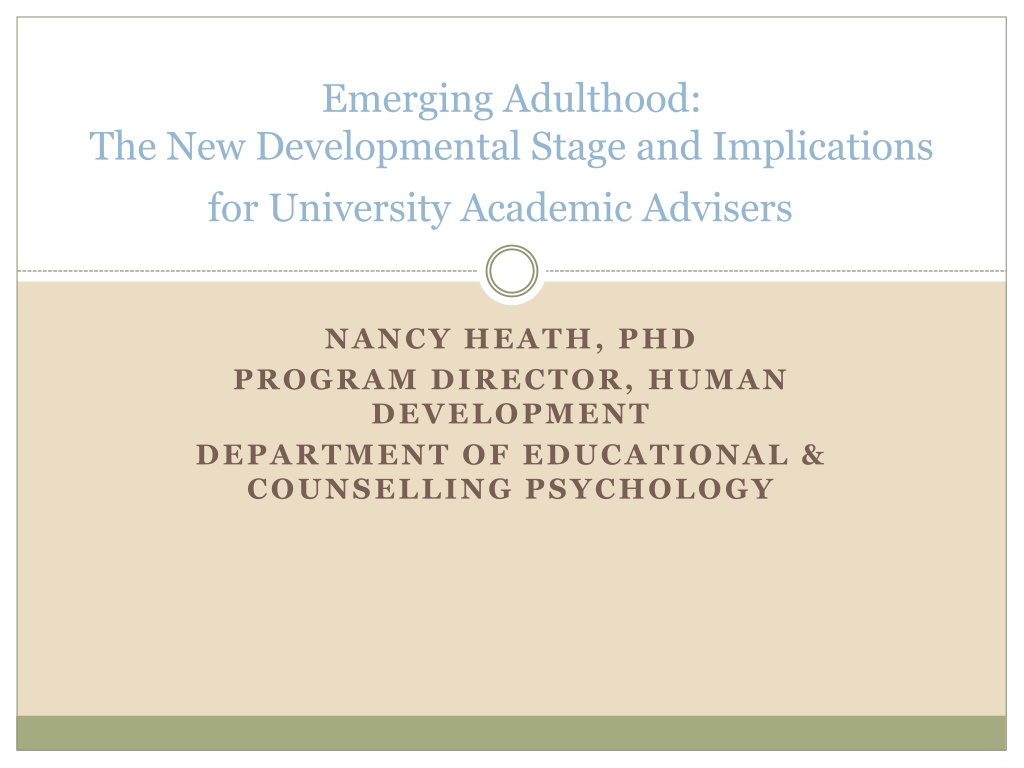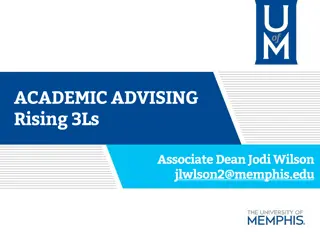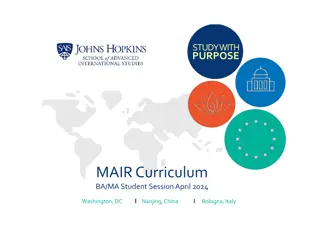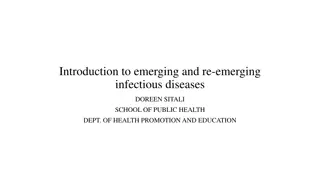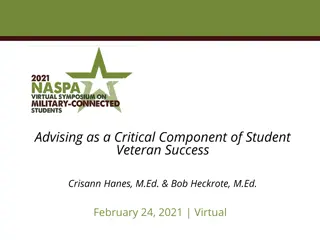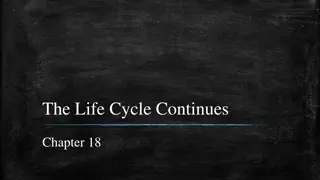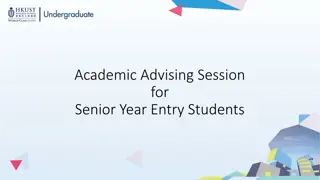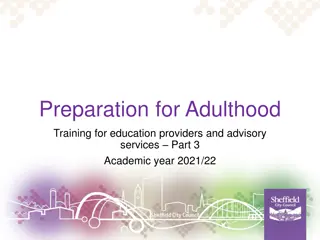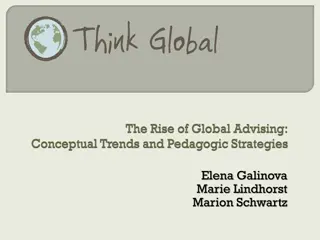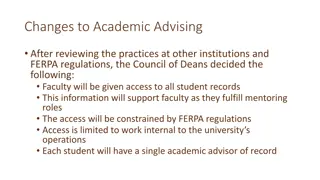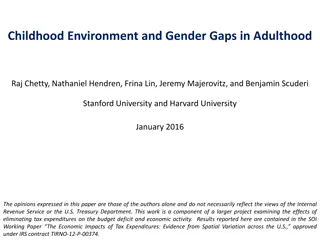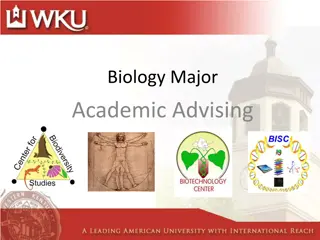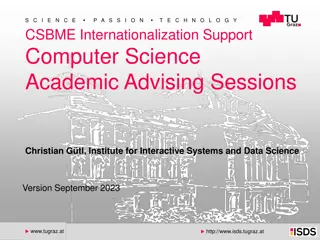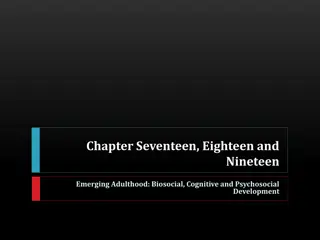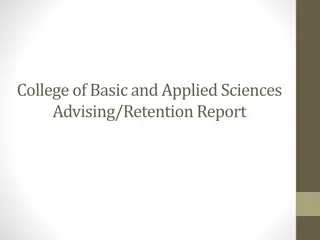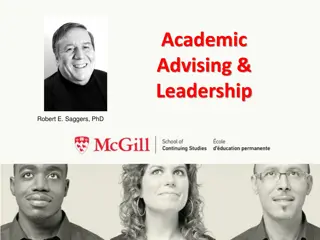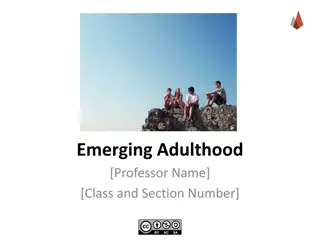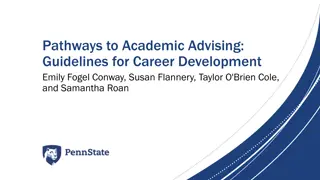Understanding Emerging Adulthood and Academic Advising Challenges
This presentation delves into the concept of emerging adulthood, a new developmental stage between adolescence and early adulthood. It explores the implications for university academic advisers and the challenges faced by individuals transitioning through this stage. The content covers past understanding, current knowledge, and how advisers can support emerging adults like Sarah, who are navigating educational and career uncertainties.
- Emerging Adulthood
- Academic Advising
- Developmental Psychology
- University Guidance
- Transition Challenges
Download Presentation

Please find below an Image/Link to download the presentation.
The content on the website is provided AS IS for your information and personal use only. It may not be sold, licensed, or shared on other websites without obtaining consent from the author. Download presentation by click this link. If you encounter any issues during the download, it is possible that the publisher has removed the file from their server.
E N D
Presentation Transcript
Emerging Adulthood: The New Developmental Stage and Implications for University Academic Advisers NANCY HEATH, PHD PROGRAM DIRECTOR, HUMAN DEVELOPMENT DEPARTMENT OF EDUCATIONAL & COUNSELLING PSYCHOLOGY
Overview Introduction Past understanding & advising Current knowledge Implications for Advisers Question Period
Introduction: The challenge of youth! Sarah tells her adviser as they review her file that she thought in high school that she wanted to go into politics and thus did no sciences. Then discovered in last year, when she worked for a candidate in the election, that she hated politics... Had to take an extra year at CEGEP to gain sciences requirements Entered McGill in Biology, found she didn t like it Switched to psychology, discouraged by stories of no clear job upon graduation Takes a gap year, works with Habitat for Humanity for a year Returns to McGill switches to Education Wants to go to graduate school but unsure in what Meets with adviser and is frustrated at lack of clear options Why is Sarah struggling?
Past Understanding Developmentally there are stages/ seasons of life Infancy/Toddlerhood 0-2yrs Childhood (Early 2-6) (Middle 6-11) Adolescence (Early 11-14) (Middle 14-16) (Late 16-18) Adulthood (Early 18-40) (Middle 40-65) (Late 65+) Early Adult transition 17-22; Entry Life Structure 22-28 (Design Adult Life, including relationships, occupations) Each stage has tasks Historically Early Adulthood and transition to adulthood consisted of short exploration with early commitment to relationship, values and career Typically by 28 Early Adulthood Life Structure in place
Advising in the past Although exceptions abound... most students: after an initial first year exploration, settled into a path fairly independent of parents and family, had less obvious parental involvement becoming clear on who they wanted to be (identity) In sum, seemed more mature !
Current Knowledge: Emerging Adulthood In early 2000, developmental psychologists proposed a new developmental stage between Adolescence and Early Adulthood Emerging Adulthood : A bit of adolescence and a bit of early adulthood! Although not without controversy there is overwhelming evidence that in industrialized nations this new stage does exist (e.g., Arnett, 1997, 2001, 2003, 2007; Berk, 2010; Buhl & Lanx 2007; Maeck, Bejcek, & Vanickova, 2007)
Emerging Adulthood 18-29 yr olds are still completing the transition to early adulthood Emerging Adulthood: 19- 25 year olds are: characterized by unprecedented exploration exploration is extensive with a dual cycle model breadth/depth making a commitment (trying something) then evaluating and trying again (broader or deeper) adolescent exploration and risk taking but without the parental supervision completing education in a drawn out and non-linear way (U.S. Department of Education, 2009)
Is emerging adulthood good or bad? ++There are clear personal and societal benefits in young people having clearer identities, values and commitments as well as greater competencies as a result by adulthood ++Also the extended exploration frequently involves more contributions to community -- For some the extended exploration leads to remaining uncommitted for too long and decreasing their ability to move forward -- Extended risk taking may be problematic for those at risk
Other considerations... There are variations by culture. This is a very western phenomenon. This can result in additional stress on students from cultures where this is not acceptable when they are in a milieu where it is common. Parents frequently do NOT know about this and fear their son/daughter is never going to grow up .
Advice for Advisors! Knowing that this is normal/common and NOT negative/ or immature. Working with our frustration over the apparent immaturity of our students. Educating students and parents (where relevant) regarding this new normal, to allay anxiety and decrease conflict. Helping the student to balance their need for extended exploration with the need to advance in development. Consciously progressing/gaining Framing it as exploration, with skill development and competency gains Goals always being discussed even when they repeatedly shift Do we need system change to adapt for this?
